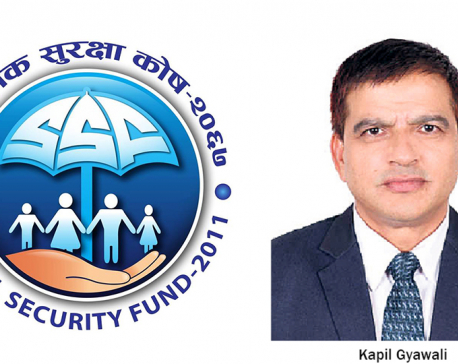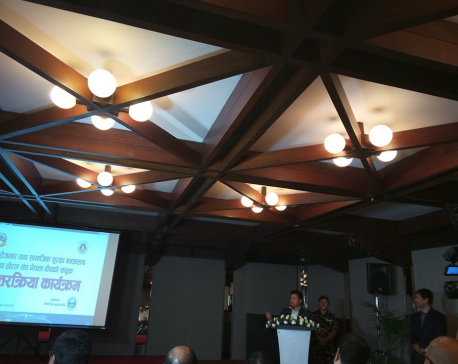
OR
Editorial
A Positive Step Towards Ensuring Social Security for All
Published On: September 3, 2023 07:40 AM NPT By: Republica | @RepublicaNepal

In a significant move aimed at bolstering social safety nets, the government has embarked on a mission to extend the coverage of the Social Security Fund (SSF) scheme to informal sector workers and those who are self-employed. This initiative, which commenced on August 17, represents a commendable stride towards fulfilling the government's commitment to providing security and welfare for all citizens, irrespective of their employment status. Up until this development, the SSF primarily encompassed individuals in the formal sector. The introduction of informal sector workers into this program has been long-awaited and advocated for by various trade unions operating within the country. These unions have persistently championed the cause of workers engaged in diverse sectors such as agriculture, transportation, construction, and domestic work, seeking equity in social security coverage. Workers in formal sectors have long enjoyed privileges like gratuity and pensions, while their counterparts in the informal sector were left to grapple with the absence of such schemes. Now, with this inclusive initiative, a path has been paved for informal sector workers to avail themselves of the much-needed social security net.
Nevertheless, there remains a degree of skepticism surrounding the effective implementation of this scheme, mainly due to the lack of clear commitment on the government's part. The government has yet to specify the exact amount that will be contributed on behalf of the over five million informal sector workers. This uncertainty underscores the pressing need for comprehensive policy and programmatic preparations to ensure the seamless execution of this program. Government officials argue that Nepal is making strides that put it ahead of neighboring countries like India and Bangladesh in terms of implementing social security schemes. The comprehensive coverage that includes workers in the formal and informal sectors, self-employment, and those employed abroad is a testament to Nepal's commitment to providing a robust safety net for its citizens.
Workers in the informal sector are required to contribute 20.37 percent of their salaries, as mandated by the government, to become a part of this transformative scheme. Those engaged in self-employment must contribute 31 percent. It's crucial to highlight that for informal sector workers, their individual contribution is 11 percent, with the government covering the remaining 9.37 percent. This system ensures that the burden of securing a social safety net is distributed equitably among stakeholders. In light of these developments, it is evident that the government's decision to incorporate informal sector workers into the Social Security Scheme is a commendable and forward-thinking move. It aligns with the nation's aspirations to create a more equitable and inclusive society, in line with the political parties' commitment to fostering a socialist-oriented approach. This endeavor represents a crucial step towards reducing income inequality and providing a safety net for all citizens, regardless of their employment circumstances. Informal sector workers, who have long been excluded from such benefits, will now have the opportunity to safeguard their future financially and improve their overall well-being.
However, it is imperative that the government takes proactive steps to ensure the smooth implementation of this scheme. Clear and transparent guidelines, along with a commitment to providing adequate funding, will be essential to its success. Additionally, raising awareness among informal sector workers about the benefits of the scheme and their responsibilities in contributing to it is vital. As a newspaper, we believe that the government's decision to extend social security coverage to informal sector workers is a significant milestone in Nepal's pursuit of a just and equitable society. It reflects the nation's commitment to providing a social safety net for all citizens, regardless of their employment status. With the right policies and concerted efforts, this initiative has the potential to transform the lives of millions of Nepalese workers and contribute to the nation's overall development and prosperity.
You May Like This

8,200 companies register with Social Security Fund
KATHMANDU, Oct 18: Over 8,200 employers have registered themselves with the Social Security Fund (SSF) to enlist their 92,000 employees,... Read More...

Over 50,000 workers listed in social security fund
KATHMANDU, Sept 12: A total of 4,790 companies and organizations have registered themselves with the Social Security Fund (SSF), according... Read More...

SSF, minimum wage to be strictly implemented: Minister Bista
KATHMANDU, Aug 26: Minister of Labor, Employment and Social Security Gokarna Bista has said that Social Security Fund (SSF) scheme should... Read More...







Just In
- NRB to provide collateral-free loans to foreign employment seekers
- NEB to publish Grade 12 results next week
- Body handover begins; Relatives remain dissatisfied with insurance, compensation amount
- NC defers its plan to join Koshi govt
- NRB to review microfinance loan interest rate
- 134 dead in floods and landslides since onset of monsoon this year
- Mahakali Irrigation Project sees only 22 percent physical progress in 18 years
- Singapore now holds world's most powerful passport; Nepal stays at 98th











Leave A Comment